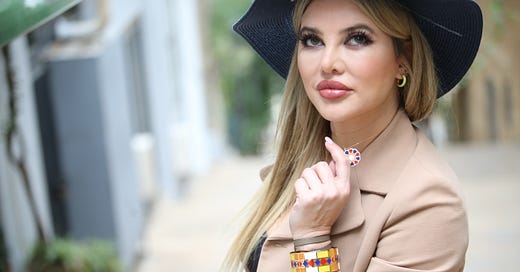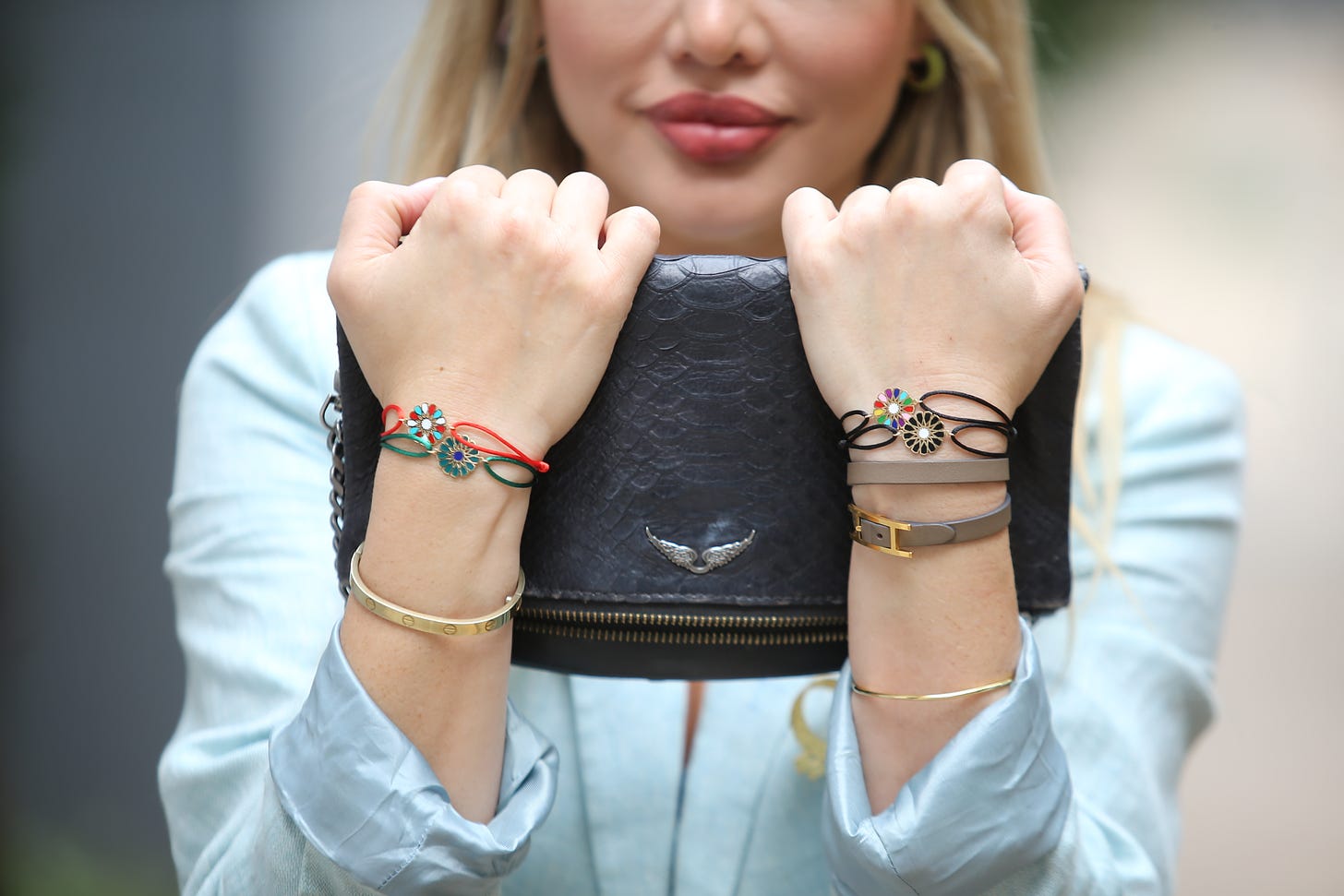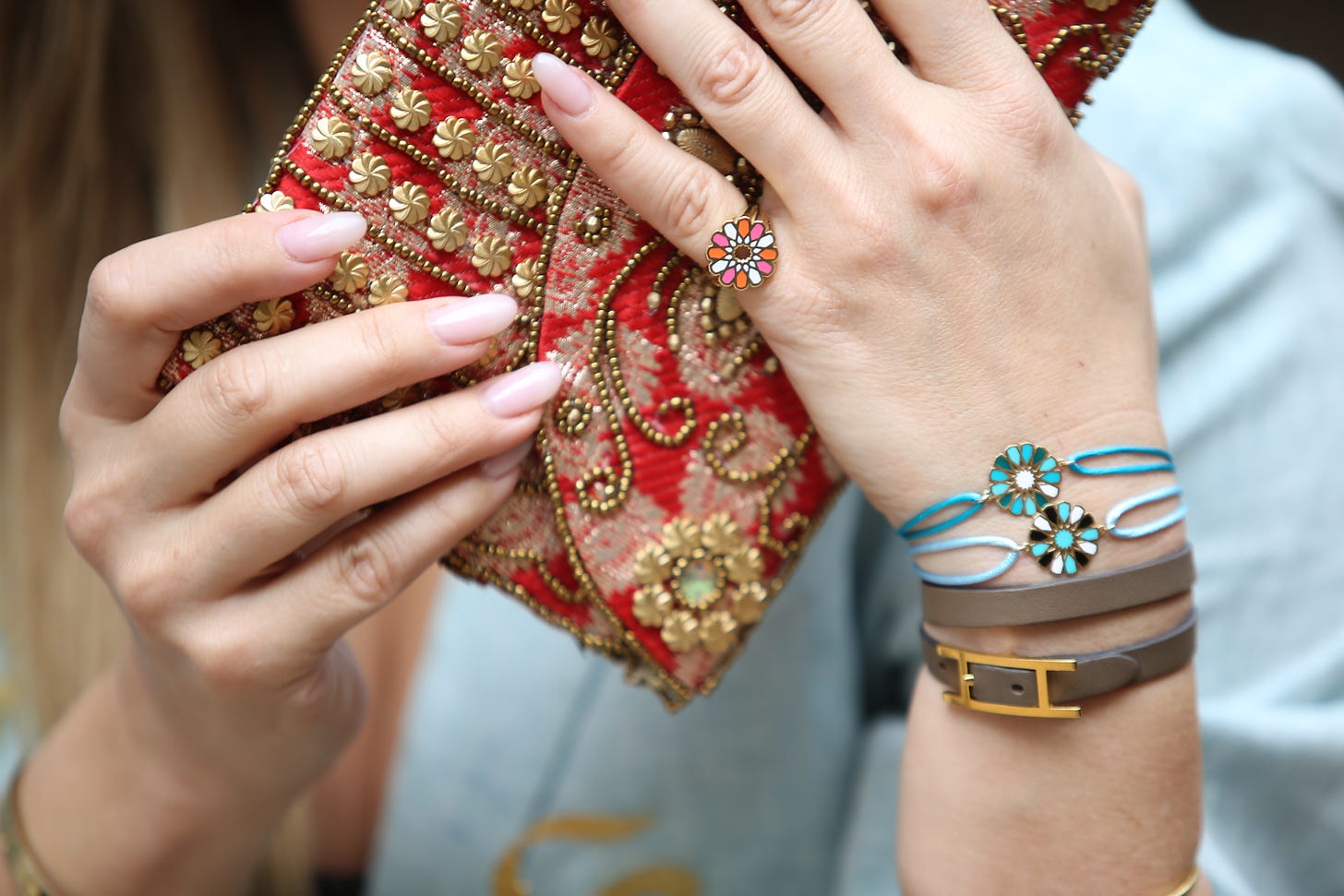Pendants And Peace: Lebanese Designer Draws From The Past
At a historic mosque in the Lebanese city of Tyre, Micheline Abukhater discovered a motif that inspired her to celebrate culture through colorful designs
Micheline Abukhater never imagined her jewelry designs would go viral. When she started selling hand-made pieces at the Sursock Museum in Beirut, she thought people might appreciate their cultural significance, and maybe a few would make a purchase. Now, everywhere she goes, she sees it – the 10-point star set in colored tiles, which has become ubiquitous in fashion, art and design around the world.
Few know it started with a history teacher in Lebanon. “Friends thought I was crazy, but then people took it and put it everywhere,” she says.
Abukhater didn’t copyright the design, but she’s happy to see it spread. For her, the motive was never to make money. Instead, she wanted to express a wish, that one day Lebanon would achieve the harmony embodied by this symbol, which recalls a time when different communities lived peacefully side by side, before civil war splintered relations between the country’s 18 sects.
Abukhater discovered the star’s heritage on a trip to southern Lebanon, when she took her students to Tyre, an ancient port city on the Levantine coast. Though predominantly Shia’ Muslim, Tyre has long had a sizeable Christian minority and was once home to a large Jewish community. Touring the old mosque, Abukhater learned from their guide that it was once a synagogue and the decorative tiles were designed by Jewish artisans.
“The Jews would design them, the Christians made them, and the Muslims sold them – everyone worked together,” she says.
One of the world’s oldest continually inhabited cities, Tyre was founded in the Bronze Age by the Phoenicians, a Semitic-speaking people who lived along the coast of modern-day Syria, Lebanon and northern Israel. Tyre grew to become the hub for their trading empire, before passing to the Persians and later the Greeks. Under Roman rule, it became a centre for Christianity before the Islamic conquest in the 7th century marked a new era in its history. As a busy trading post and thriving port city, it has always drawn people of diverse cultures and communities, including a sizeable Jewish community, whose presence there dates back to biblical times.
Today, most of Lebanon’s Jewish community is long gone, and the Christian population is dwindling as the country teeters on the edge of collapse. Abukhater was tempted to leave after losing her house, her car and many possessions during the Beirut port blast in 2020, but finds she cannot abandon her country. “The essence of Lebanon comes from its different communities – it has always been a melting pot of people and cultures,” she says. “So many people are leaving. If I go, another little bit of this country’s culture will vanish with me,” she says.
Instead, she hopes to use her jewelry brand, Inspiration of Beirut, to inspire conversations about Lebanon’s diverse cultural heritage, drawing on her knowledge of the country’s past to remind people of a time when different communities coexisted more harmoniously. Looking past the divisions that have splintered society since the outbreak of civil war in 1975, she describes the shared Lebanese passion for enjoying life and points to the county’s 1960s heyday, when Beirut, with its glamorous hotels, restaurants and beach clubs, was known as the Paris of the Middle East. “In Lebanon, we love to have fun. It’s a way of living. Even if a woman is poor, she tries to dress well and wear jewelry. It’s part of our culture,” she says.
As conflict looms and the Lebanese wait to see whether their country will be dragged into another war, Abukhater worries that the last vestiges of this era will vanish forever. “We are fighting to keep cultural liberty and freedom of expression. If the war happens, many will leave, and the fanatics will take over,” she says.
Already the impacts are being felt. Her sales on Black Friday were disappointing. “No one is in the mood to buy anything. They are waiting to see if the war will happen,” she says.
Abukhater has higher hopes for Christmas, when people spend a little more. Her pieces use gold and silver, with prices starting at around $160 for a pair of gold earrings. All are handmade by Lebanese artisans, passing from the artist who draws up her designs to a jewelry maker who crafts the structure, a specialist to add the enamel and a fourth person to polish each piece ready to sell. In the future, she hopes to open her own atelier and employ many of these artisans in-house. But that will depend on the situation in her country, which is reeling from multiple crises, even without the specter of war.
Some days, life in Lebanon feels too hard, and Abukhater is tempted to join the exodus of people leaving. On those days, she tells herself that when her daughter finishes school, they will move abroad and start afresh. “But then I think, who will stay? Some people must stay and fight for our way of living.” So she is channeling her energies into Inspiration of Beirut to remind people of a time when Lebanese from all communities celebrated their shared identity.
With an Innovation Hub grant from Ideas Beyond Borders, she is opening an online store accompanied by a social media campaign to advertise her products. She also plans to stage a pop-up stall in the mall, where she can engage with customers and tell them the story behind her brand. “I tell people it draws on a time when there was no war, when Lebanon was calm and people came from all over the world to enjoy our way of life – to go from the beach to the mountains in an hour, enjoy good Mediterranean food and soak up the sunshine.
This article was written by Olivia Cuthbert.






